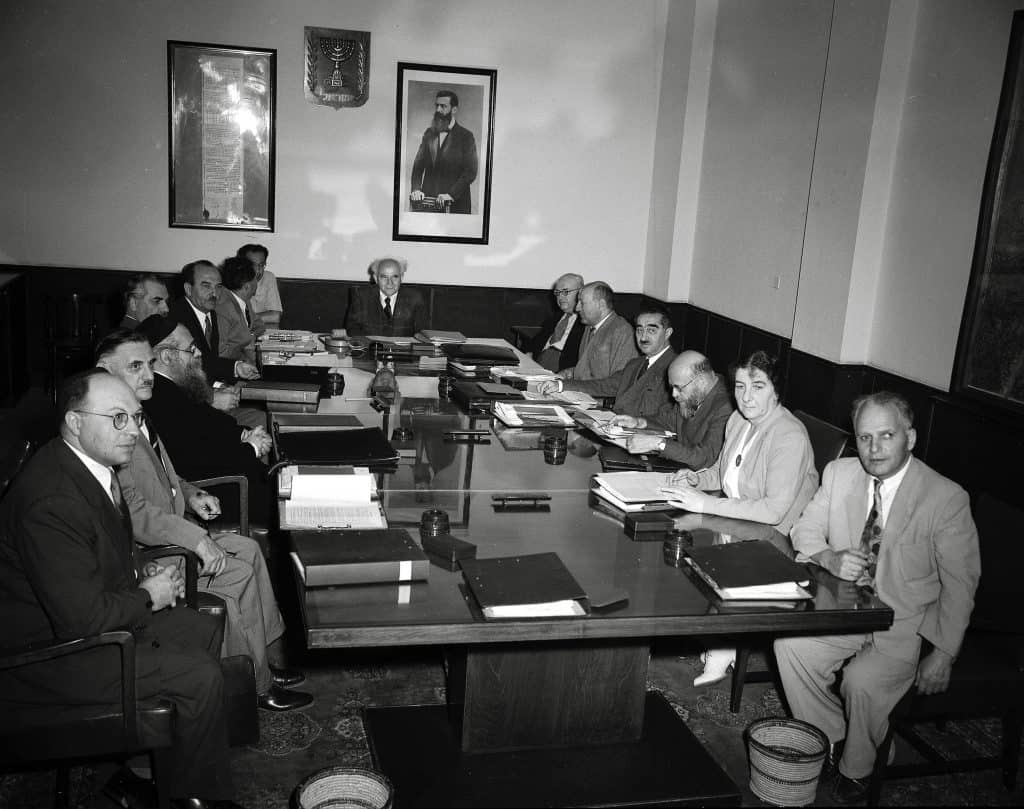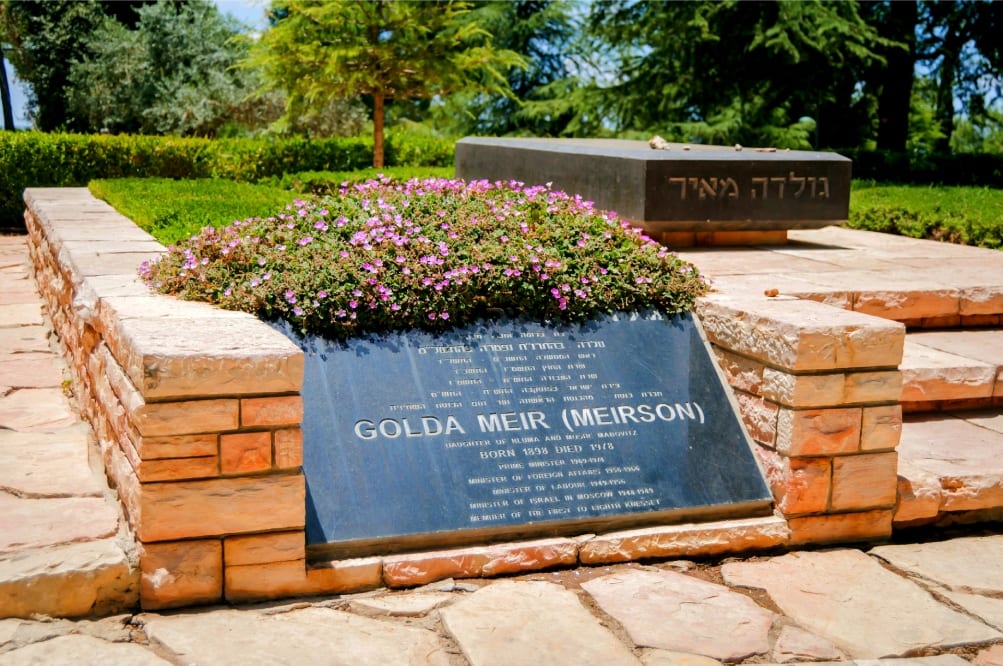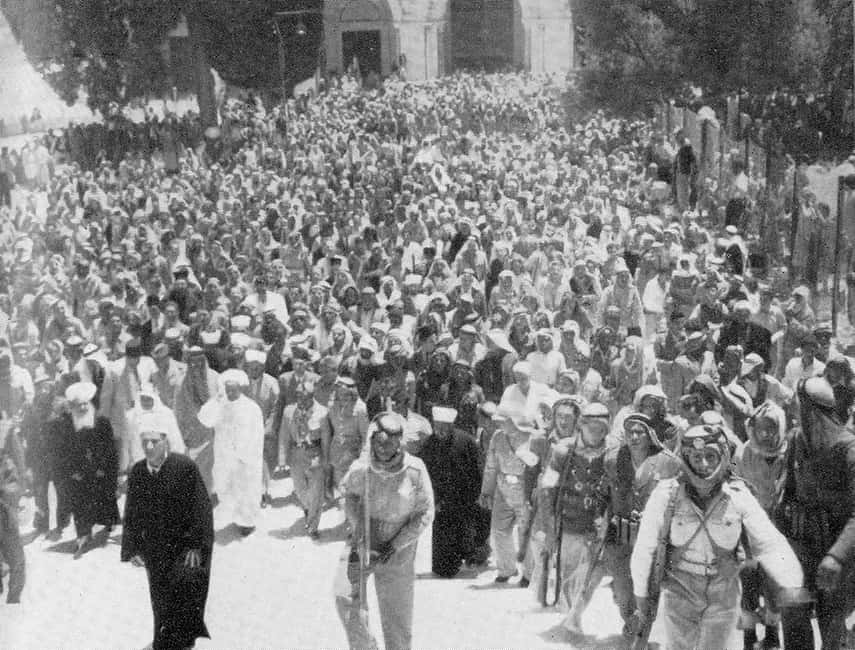Golda Meir’s secret meetings with King Abdullah are indeed interesting. Golda Meir describes these two meetings in her autobiography, ‘My Life’. She says she had two secret meetings with King Abdullah. While the first meeting was at the end of 1947; and the second meeting took place in Amman just before the Declaration of the State of Israel. Meir met with Abdulla twice in six months. Meir kept for a secret for a long time, even after Abdulla’s Assassination in 1951.

The First Meeting With King Abdullah
So the meeting between Golda Meir met with Abdullah was held in Naharayim, on the banks of the Jordan River. Then, Golda Meir was heading the Foreign Affairs Office of the Jewish Agency. Golda says in her Autobiography
“For the first time, I met with Abdullah in early November 1947. He agreed to meet with me – as head of the Jewish Agency’s Political Department – in Naharayim on the Jordan, where the Israel Electric Company’s hydroelectric power plant was located. I came with one of our Arab experts, Eliyahu Sasson. We drank the usual cups of coffee as the ritual demands, and then we started talking. Abdullah was a short man, very calm and very majestic. He quickly made it clear: he would not let any Arab attack on us. He will always remain our friend, he said, and like us, he too wants more peace than anything else. After all, we have a common enemy, the Jerusalem Mufti, Hajj Amin al-Husseini. And if that is not enough, he suggested we meet again, after the UN vote.”
Golda Meir, ‘My Life’.
Since that meeting, the communication between the King and Jewish leadership was increasingly worrying. It seems the King is not going to keep his promise and join the Arab League coalition against Israel. Golda is describing her thoughts:
“Is that so?” I asked. The answer from Amman was quick and negative. King Abdullah was surprised at my question and hurt by it. He asked me to remember three things: he was a Bedouin, and in being so, a man of honor; he is a king, and therefore twice as much a man of honor; And finally, that he would never break a promise he made to a woman. So there could be no justification for my anxiety at all.
Golda Meir, ‘My Life’.
The Second Meeting With Abdulla In Amman
The second meeting with the King took place already in Amman. Meir is accompanied by Ezra Danin, a Haganah intelligence expert who has familial relations with the King. Danin and Meir disguised themselves as an Arab couple and travel through enemy lines to Transjordan. Meir writes:
“But we knew other things. In the first week of May; we had no doubt that despite all his promises; Abdullah shared his fate with the Arab League. Now we debated the reasons for and against another meeting before we were late. Maybe at the last moment he can be persuaded to return. If not, maybe at least we can find out where he and his Arab Legion (whose British commanders and officers) have committed to fight against us. Much was at stake. Not only was the legion definitely the best Arab army in the region, but there was one more vital consideration: if some miracle happens and the Jordanian remains out of war, then the Iraqi army will be much harder to enter the country and join the attack against us. Ben-Gurion was of the opinion that we could not lose anything if we tried again, so I requested a second meeting, and I approached Ezra Danin to accompany me.”
(Meir, p.216)
This time, however, Abdullah refused to come to Naharayim. “It’s too dangerous”, he told Meir. “If I want to see me you’ll have to come to Amman and bear the entire risk”. He should not be demanded, he informed Golda, to warn the Arab legion that he is waiting for Jewish guests from the Land of Israel, and he will not accept responsibility for anything that might happen to us on the way.
The Journey To Amman
“The next morning (May 11, 1948), I got out in the car to Haifa, where I had to meet Ezra. It was already decided that he would not disguise himself and settle for wearing a “Kulpak”. He spoke fluent Arabic, was proficient in Arab customs, and could easily be considered an Arab. As for me, I will ride in the traditional, dark and wide dresses of an Arab woman. I didn’t know Arabic at all, but as a Muslim woman accompanying her husband it was far fetched that they would require me to say anything to anyone. The evening dress and scarves I needed were already ordered, and Ezra Danin explained the way to me. We will replace cars several times, he said, to make sure we are not being followed; And at some point that night someone would appear not far from the King’s palace to take us to Abdullah. The main problem was how not to arouse the suspicions of Arab Legion soldiers at the checkpoints”
(Meir, p.217).

Golda Meir Continues On Describing Those Nerves Wrecking Moments:
“It was a long, long journey through the night. First get into one car, then get out of it and get into another car for a few more miles, and then, in Naharayim, move to a third car. We didn’t talk to each other at all hours. I had complete confidence in Ezra that he could move us safely beyond enemy lines; and so my mind was on the outcome of our mission that I did not think about what would happen if we were caught, God forbid.
Luckily for us, although we had to identify several times, we arrived at the right time for the meeting we had set up without being discovered. The person who should have taken us to Abdullah was one of his most loyal aides, one Bedouin whom the King adopted and raised from his childhood and who was accustomed on doing dangerous errands for his masters. (Meir, p.217)
The Decisive Meeting And The New Conditions
“Then Abdullah entered the room. He was very pale, and seemed to be under heavy pressure. Ezra translated for us and we talked for about an hour. I started the conversation and went straight to the point: “Did you break the promise you gave us after all?”, I asked him. He did not answer my question directly.
Instead, he said this: “When I promised the thing, I thought I was ruled by my own fate and I could do what was right in my eyes. But since then it has turned out not to be the case.” He then went on to say that he was formerly alone but now “I am one of five” – and we have found out that the other four are Egypt, Syria, Lebanon and Iraq. Nevertheless, he was of the opinion that war could be prevented.”
(Meir, p.220)
The Meeting Is Getting Tense
“Why are you so quick to declare your country?” He asked me. “What’s the rush? You are so impatient!” I told him that, in my opinion, having waited 2,000 years you can’t say we’re “in a hurry,” and he seemed to accept it. “Don’t you understand,” I said, “that we are your only allies in this area? Everyone else is your enemy.” “Yes,” he said, “I know it. But what can I do? It’s not up to me.” Then I said to him: “You must know that if we fight a war we will fight and we will win.”
He sighed and said again, “Yes, I know. Your duty is to fight. But why not wait a few years? Stop your demands for free immigration. I will take over the whole country and you will have representation in my parliament. I will treat you very well, and there will be no war. ” (Meir, p.221)
(Meir, p.221)

Golda Meir Rejects His Offer
I tried to explain to him that his plan was impossible. “You know everything we did and how hard we worked,” I said. “Do you think we did all this just to have a representation in a foreign parliament? You know what we want and what we aspire to. But maybe we can meet again – after the war and after becoming a Jewish state. “
Should We Declare A Jewish State? Should We Go To War?
“Anyway, from Naharaim they drove me straight back to Tel Aviv. The next morning was meant to be a meeting at Mapai’s office – all that week, of course, almost incessant rounds of conversations were going on – and I knew Ben Gurion would be there […]
As I entered the room, he raised his head, looked at me, and said, “Well?”, I sat down and wrote a few words on a piece of paper. “No avail,” I wrote. “There will be a war. Ezra and I saw from the distance the Jordanian army.” I could hardly find myself in Ben Gurion’s face when he read the note, but, thank God, he did not change his mind – nor our opinion” (Meir, My Life)
Within two days, the final decision had to be made: to declare a Jewish state or not? […] Therefore, Ben-Gurion invited two people: Yigal Yadin, who was the Hagana’s operations officer, and Israel Galili, who was in fact the chief commander. Their answers were almost identical – and appalling. Only in two things can we be sure, they said: The British will pull out and the Arabs will invade, then? They were both silent, but a minute later, Yadin said: “To all the best we can tell you we have a fifty-fifty chance; we have the same chance of winning and discriminating.”
(Meir, My Life)







